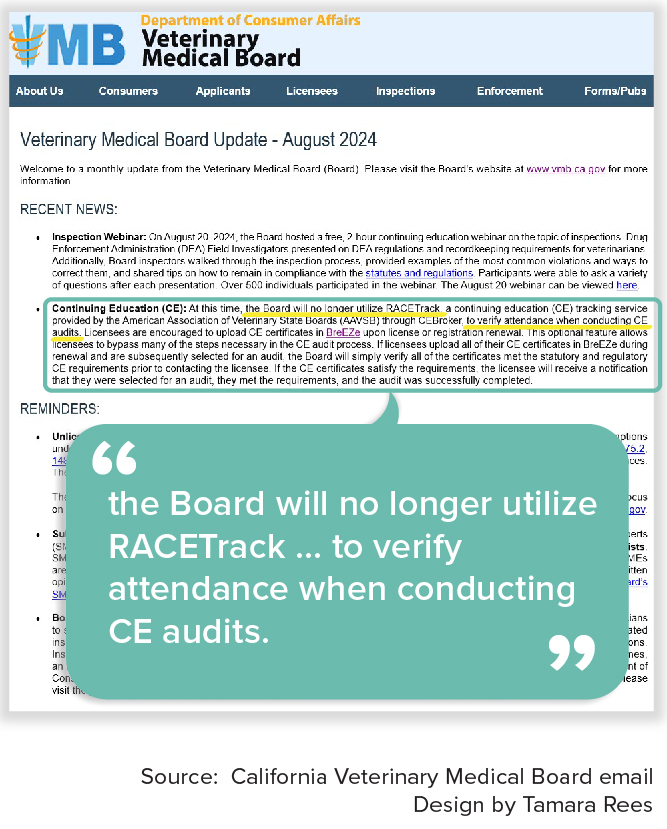 Listen to this story.
Listen to this story.
Notification received by a licensee

California regulators won't use a controversial digital platform to verify that licensed veterinarians and veterinary technicians are meeting their continuing education obligations, describing the service as unreliable.
The service, known as RACEtrack, is promoted by the American Association of Veterinary State Boards (AAVSB), a nonprofit that represents regulators in 63 North American jurisdictions, including California.
The state Veterinary Medical Board found that the platform was providing "inaccurate information ... related to the number of hours [of continuing education] attended," a board spokesperson told the VIN News Service.
The system also was found to report courses in duplicate and was missing some information the board needed to verify that a course met state requirements, according to Peter Fournier in the state Department of Consumer Affairs, under which the veterinary board operates.
Veterinarians and veterinary technicians licensed in the state were notified in August that the California board no longer would use RACEtrack to verify course attendance. As an alternative, licensees may upload course-completion certificates to a state-run online system called BReEZe.
Those who opt not to use BReEZe may, if audited, use the old-fashioned method of mailing or emailing their certificates to the board, according to Fournier.
RACEtrack is operated by CE Broker, a company with offices in Florida and Colorado. CE Broker has since 2020 provided the digital platform for the Registry of Approved Continuing Education, or RACE, which is run by the AAVSB.
The AAVSB doesn't pay for RACEtrack. Instead, CE Broker makes money by marketing services to licensees, such as a $39.99 per year "professional account" that keeps a transcript of courses completed and provides storage of digital documents, among other things. According to its website, CE Broker provides continuing education management services to more than 350 professions.
The AAVSB's decision to use RACEtrack caused a stir in 2020 and 2021 among continuing education providers because CE Broker initially indicated that providers who shared revenues with the company would receive favorable positioning on the platform's course listings. The company later backed off that approach. Providers also expressed concerns about having to report the identities of licensees who take their courses, seeing it as a privacy intrusion.
Today, "almost all states accept reports from the RACEtrack system submitted by licensees for their CE history," according to James Penrod, executive director of the AAVSB. Use of RACEtrack by licensees is voluntary except in South Carolina, where it is required by the state.
Asked whether states besides California have reported inaccuracies or other problems with RACEtrack, Penrod replied by email that the association has "had discussions with our member boards ... to gain their input," adding, "We also have a webinar scheduled in October [with] our member boards to explain the benefits of the auditing suite and answer any questions or concerns."
Fournier said the California board "is committed to working with AAVSB to address concerns in order to resume using RACEtrack in the near future."
CE Broker deferred to the AAVSB and the California board to address the specifics of the concerns. A company representative, Kelly Parker, provided a general comment by email, saying that the company has been in the continuing education management business for more than 20 years and is "committed to continuously enhancing the experience for professionals."
From the standpoint of licensees in California, the situation is not a problem, said Dr. Grant Miller, director of regulatory affairs at the California Veterinary Medical Association. "This is not really a big issue since I don't think a large number of veterinarians use RACEtrack," he said.
Those who do, Miller added, "can still use it to record their CE and store certificates. If they are audited ... they can simply download their certificates from RACEtrack and submit them directly on BreEZe."
California continues to participate in an AAVSB data exchange program known as VIVA, which is short for Veterinary Information Verification Agency. VIVA is intended to enable boards to readily share licensee information with each other and the association.
Apart from California, only Indiana participates in VIVA at the moment, according to Penrod. He said three more jurisdictions are in the process of joining.